|
Equities stuttered as the end of the first quarter approaches. The concerns are not very different than those that have addled investors for most of 2016 to a varying degree. Focus was on post Federal Reserve Board members' comments regarding the trajectory of U.S. interest rates and the timing of the next increase. Some speakers (nonvoters) said that April was in play for a possible increase. The U.S. currency regained some of the losses that were incurred after the Fed's March 16 announcement that implied fewer interest rate increases in 2016. Fed officials reminded the markets that they still want to move forward with the rate increases.
Most equity indexes retreated during the week with those in Europe the hardest hit. U.S. equity indexes were down for the first week since February 12. Reaction to Tuesday's terrorist attacks in Brussels was subdued. However, some investors shied away from risk prior to the long weekend.
| |
|
2015 |
2016 |
% Change |
|
Index |
Dec 31 |
Mar 18 |
Mar 25 |
Week |
2016 |
| Asia/Pacific |
|
|
|
|
|
|
| Australia |
All Ordinaries |
5344.6 |
5239.4 |
5151.62 |
-1.7% |
-3.6% |
| Japan |
Nikkei 225 |
19033.7 |
16724.8 |
17002.75 |
1.7% |
-10.7% |
| Hong Kong |
Hang Seng |
21914.4 |
20671.6 |
20345.61 |
-1.6% |
-7.2% |
| S. Korea |
Kospi |
1961.3 |
1992.1 |
1983.81 |
-0.4% |
1.1% |
| Singapore |
STI |
2882.7 |
2906.8 |
2847.39 |
-2.0% |
-1.2% |
| China |
Shanghai Composite |
3539.2 |
2955.2 |
2979.43 |
0.8% |
-15.8% |
|
|
|
|
|
|
|
| India |
Sensex 30 |
26117.5 |
24952.7 |
25337.56 |
1.5% |
-3.0% |
| Indonesia |
Jakarta Composite |
4593.0 |
4885.7 |
4827.09 |
-1.2% |
5.1% |
| Malaysia |
KLCI |
1692.5 |
1716.3 |
1703.79 |
-0.7% |
0.7% |
| Philippines |
PSEi |
6952.1 |
7306.7 |
7360.05 |
0.7% |
5.9% |
| Taiwan |
Taiex |
8338.1 |
8810.7 |
8704.97 |
-1.2% |
4.4% |
| Thailand |
SET |
1288.0 |
1383.0 |
1394.78 |
0.9% |
8.3% |
|
|
|
|
|
|
|
| Europe |
|
|
|
|
|
|
| UK |
FTSE 100 |
6242.3 |
6189.6 |
6106.48 |
-1.3% |
-2.2% |
| France |
CAC |
4637.1 |
4462.5 |
4329.68 |
-3.0% |
-6.6% |
| Germany |
XETRA DAX |
10743.0 |
9950.8 |
9851.35 |
-1.0% |
-8.3% |
| Italy |
FTSE MIB |
21418.4 |
18611.3 |
18165.84 |
-2.4% |
-15.2% |
| Spain |
IBEX 35 |
9544.2 |
9051.1 |
8789.80 |
-2.9% |
-7.9% |
| Sweden |
OMX Stockholm 30 |
1446.8 |
1391.4 |
1345.34 |
-3.3% |
-7.0% |
| Switzerland |
SMI |
8818.1 |
7813.7 |
7775.58 |
-0.5% |
-11.8% |
|
|
|
|
|
|
|
| North America |
|
|
|
|
|
|
| United States |
Dow |
17425.0 |
17425.0 |
17515.73 |
-0.5% |
0.5% |
|
NASDAQ |
5007.4 |
5007.4 |
4773.50 |
-0.5% |
-4.7% |
|
S&P 500 |
2043.9 |
2043.9 |
2035.94 |
-0.7% |
-0.4% |
| Canada |
S&P/TSX Comp. |
13010.0 |
13010.0 |
13358.11 |
-1.0% |
2.7% |
| Mexico |
Bolsa |
42977.5 |
42977.5 |
45647.570 |
0.4% |
6.2% |
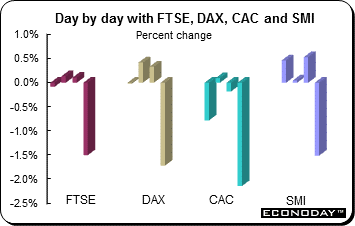 European equities retreated in the holiday shortened week. The FTSE was down 1.3 percent, the CAC dropped 3.0 percent, the DAX declined 1.0 percent and the SMI lost 0.5 percent. Despite the declines, Tuesday's terrorist attacks in Brussels had less of a negative impact than prior attacks of this nature. Note in the graph that the biggest declines occurred on Thursday as investors took defensive positions before the long weekend. Key economic data were at the beginning of the week with the flash PMIs indicating a modicum of improvement in economic growth. Readings for Germany's Ifo and ZEW surveys also showed a slight improvement. Commodity price gyrations continued to cause further weakness in energy and resource stocks. European equities retreated in the holiday shortened week. The FTSE was down 1.3 percent, the CAC dropped 3.0 percent, the DAX declined 1.0 percent and the SMI lost 0.5 percent. Despite the declines, Tuesday's terrorist attacks in Brussels had less of a negative impact than prior attacks of this nature. Note in the graph that the biggest declines occurred on Thursday as investors took defensive positions before the long weekend. Key economic data were at the beginning of the week with the flash PMIs indicating a modicum of improvement in economic growth. Readings for Germany's Ifo and ZEW surveys also showed a slight improvement. Commodity price gyrations continued to cause further weakness in energy and resource stocks.
The euro area economic recovery is expected to continue at a moderate pace as global concerns such as the emerging market slowdown and a stronger euro weaken prospects for stronger expansion according to the European Central Bank's latest economic bulletin. "The economic recovery in the euro area is continuing, albeit with signs of a moderation in growth at the beginning of the year due to a weaker external environment," the bank said. The ECB expects domestic demand to be further supported by its monetary policy measures and their favorable impact on financial conditions, the slightly expansionary fiscal stance, and the favorable impact on employment of past structural reforms. Further, low oil prices should provide additional support for households' real disposable income and corporate profitability, and thus for private consumption and investment, the ECB said.
 Most equity indexes retreated last week. Only the Nikkei (up 1.7 percent), the Shanghai Composite (up 0.8 percent), the Sensex (up 1.5 percent and the SET (up 0.9 percent) gained in the holiday shortened week. Essentially, investors continued to monitor and react to comments from China, FedSpeak and commodity price gyrations. A key theme in global markets this week was a stronger dollar, as Federal Reserve board members kept alive expectations for another interest rate increase, possibly as soon as April. There was surprisingly little reaction to the Brussels terrorist attacks. Most equity indexes retreated last week. Only the Nikkei (up 1.7 percent), the Shanghai Composite (up 0.8 percent), the Sensex (up 1.5 percent and the SET (up 0.9 percent) gained in the holiday shortened week. Essentially, investors continued to monitor and react to comments from China, FedSpeak and commodity price gyrations. A key theme in global markets this week was a stronger dollar, as Federal Reserve board members kept alive expectations for another interest rate increase, possibly as soon as April. There was surprisingly little reaction to the Brussels terrorist attacks.
In China, Premier Li Keqiang said Thursday morning that the country was working to address volatility in its economy. He added that Beijing wouldn't deliberately weaken the yuan to boost exports. The Shanghai market pared losses after his speech but declined in the afternoon. Chinese investors were also selling on worries about a potential increase in short selling, in which investors borrow stock to bet on its decline. A brokerage firm said overnight that it would resume allowing investors to short stocks Thursday. Analysts said selling pressure would be limited, however. Easing short-selling rules suggests China's securities regulator wants to restore basic functions and stability to the stock market, they said.
Japanese equities are especially sensitive to yen fluctuations at this time of year. For example, the Japanese market closed higher on Friday for the first time in three days with a weaker yen boosting exporters' shares. Buying by investors who wanted to secure dividends and other shareholders benefits before companies close their books at the end of the fiscal year in late March also boosted shares. Stocks also found support from investors who wanted to grab dividends for the fiscal year. Trading on next Monday will be the last day for securing the right to receive dividends and other shareholder benefits from companies closing their books on March 31.
On Friday, the Bank of Japan published an 'easy to understand' note on negative interest rates in an effort to explain to the public the key elements of its controversial policy. The note which is posted on its website answers frequently asked questions such as whether banks can start charging households for holding deposits to pass on the cost they incur from negative rates. It is rare for the BoJ to issue a note targeting the general public on a specific policy step, underscoring its concern over the unpopularity of negative interest rates.
The BoJ unexpectedly cut a benchmark interest rate to minus 0.1 percent in January as it stepped up its faltering efforts to revive growth and pull Japan out of years of deflation. But the historic shift has failed to boost stock prices or arrest an unwelcome rise in the yen, drawing criticism from lawmakers for confusing, rather than calming, markets. Since then, the BoJ has been in damage control with the bank scrambling to find positives in the policy which is proving unpopular with both the public and banks.
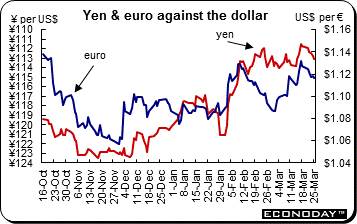 The U.S. dollar was up against its major counterparts on the week including the yen, euro, pound sterling, Swiss franc and the Canadian and Australian dollars. The U.S. currency gained at week's end after St. Louis Federal Reserve Bank President James Bullard suggested there was a chance interest rates could be raised in April. The hawkish tone buoyed the U.S. dollar, which was stronger against Asian currencies during the region's trading hours. On March 16 at the Federal Reserve's policy meeting, its "dot plot" interest rate projections suggested just two 0.25 percentage point increases this year, down from expectations of four in December. However commentary from U.S. policymakers during the week suggesting that rates could still go up as early as the April FOMC meeting spurred a rebound in the dollar. The U.S. dollar was up against its major counterparts on the week including the yen, euro, pound sterling, Swiss franc and the Canadian and Australian dollars. The U.S. currency gained at week's end after St. Louis Federal Reserve Bank President James Bullard suggested there was a chance interest rates could be raised in April. The hawkish tone buoyed the U.S. dollar, which was stronger against Asian currencies during the region's trading hours. On March 16 at the Federal Reserve's policy meeting, its "dot plot" interest rate projections suggested just two 0.25 percentage point increases this year, down from expectations of four in December. However commentary from U.S. policymakers during the week suggesting that rates could still go up as early as the April FOMC meeting spurred a rebound in the dollar.
It has only been a week since the Fed sent the dollar lower with a dovish dot plot and press conference. However, the dollar has retraced most of its losses on subsequent comments from Fed officials suggesting rate increases this year, perhaps as early as the April 27 meeting. This isn't new information, and it has been communicated mainly by non-voters. Still, the dollar was up on the week.
|
|
2015 |
2016 |
% Change |
|
|
Dec 31 |
Mar 18 |
Mar 25 |
Week |
2016 |
| U.S. $ per currency |
|
|
|
|
|
|
| Australia |
A$ |
0.7288 |
0.760 |
0.751 |
-1.1% |
3.1% |
| New Zealand |
NZ$ |
0.6833 |
0.679 |
0.669 |
-1.5% |
-2.1% |
| Canada |
C$ |
0.7231 |
0.768 |
0.754 |
-1.8% |
4.3% |
| Eurozone |
euro (€) |
1.0871 |
1.127 |
1.116 |
-1.0% |
2.7% |
| UK |
pound sterling (£) |
1.4742 |
1.448 |
1.413 |
-2.4% |
-4.2% |
|
|
|
|
|
|
|
| Currency per U.S. $ |
|
|
|
|
|
|
| China |
yuan |
6.4937 |
6.472 |
6.516 |
-0.7% |
-0.3% |
| Hong Kong |
HK$* |
7.7501 |
7.757 |
7.758 |
0.0% |
-0.1% |
| India |
rupee |
66.1537 |
66.506 |
66.636 |
-0.2% |
-0.7% |
| Japan |
yen |
120.2068 |
111.690 |
113.110 |
-1.3% |
6.3% |
| Malaysia |
ringgit |
4.2943 |
4.053 |
4.037 |
0.4% |
6.4% |
| Singapore |
Singapore $ |
1.4179 |
1.359 |
1.371 |
-0.9% |
3.4% |
| South Korea |
won |
1175.0600 |
1162.440 |
1169.170 |
-0.6% |
0.5% |
| Taiwan |
Taiwan $ |
32.8620 |
32.363 |
32.678 |
-1.0% |
0.6% |
| Thailand |
baht |
36.0100 |
34.894 |
35.290 |
-1.1% |
2.0% |
| Switzerland |
Swiss franc |
1.0014 |
0.9696 |
0.9783 |
-0.9% |
2.4% |
| *Pegged to U.S. dollar |
|
|
|
|
|
|
| Source: Bloomberg |
|
|
|
|
|
|
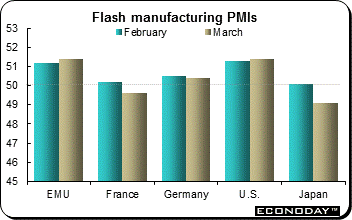 At a slightly faster rate this month than in February the composite PMI flash reading was 53.7, up 0.7 points from its final February reading and at a 3-month high. The improvement was mainly attributable to services where the flash PMI weighed in at 54.0, up from a final 53.3 in mid-quarter and also a 3-month peak. Manufacturing (51.4 after 51.2) made limited progress too (see graph). Growth of aggregate new orders was little changed from February's near-12 month low and backlogs were only stable as an increase in manufacturing was offset by a fall in services. Moreover, total employment saw its smallest gain since last September as headcount growth dropped in both sectors. Prices were weak with input costs down for a third month in a row and output charges falling for a sixth time in as many months. For the core countries, the French composite output index provisionally rose to 51.1, a 5-month high, while, at 54.1, Germany saw no change. Elsewhere in the region the activity rate edged higher from February's 5-month low. At a slightly faster rate this month than in February the composite PMI flash reading was 53.7, up 0.7 points from its final February reading and at a 3-month high. The improvement was mainly attributable to services where the flash PMI weighed in at 54.0, up from a final 53.3 in mid-quarter and also a 3-month peak. Manufacturing (51.4 after 51.2) made limited progress too (see graph). Growth of aggregate new orders was little changed from February's near-12 month low and backlogs were only stable as an increase in manufacturing was offset by a fall in services. Moreover, total employment saw its smallest gain since last September as headcount growth dropped in both sectors. Prices were weak with input costs down for a third month in a row and output charges falling for a sixth time in as many months. For the core countries, the French composite output index provisionally rose to 51.1, a 5-month high, while, at 54.1, Germany saw no change. Elsewhere in the region the activity rate edged higher from February's 5-month low.
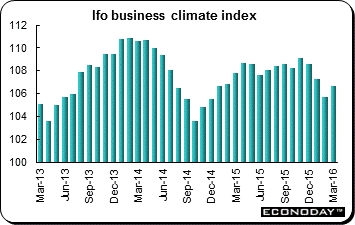 March Ifo survey paints a slightly improved picture of German industry compared with February. At 106.7, the headline sentiment index was up 1 point from its previous reading. This was the first increase since November 2015. The overall gain reflected stronger readings on both current conditions and expectations. The former rose 0.9 points to 113.8, its second successive advance and its highest value since last September. Expectations were up a slightly larger 1.2 points at 100.0, their first increase since November but still more than 2 points short of their January posting. At a sector level, confidence made small gains in all areas apart from construction. Retail (10.4 after 4.4) would seem to have had a particularly good month but sentiment in manufacturing (6.5) only recovered part of February's loses. March Ifo survey paints a slightly improved picture of German industry compared with February. At 106.7, the headline sentiment index was up 1 point from its previous reading. This was the first increase since November 2015. The overall gain reflected stronger readings on both current conditions and expectations. The former rose 0.9 points to 113.8, its second successive advance and its highest value since last September. Expectations were up a slightly larger 1.2 points at 100.0, their first increase since November but still more than 2 points short of their January posting. At a sector level, confidence made small gains in all areas apart from construction. Retail (10.4 after 4.4) would seem to have had a particularly good month but sentiment in manufacturing (6.5) only recovered part of February's loses.
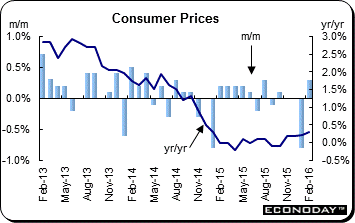 February consumer price index was up 0.2 percent and 0.3 percent from a year ago. In terms of the change in the yearly rate, the main negative impact came from transport where flat prices on the month compared with a 0.4 percent rise over the same period in 2015. A smaller downward contribution was provided by miscellaneous goods and services which posted no move this time around after a 0.2 percent gain a year ago. Food & drinks (0.1 percent after minus 0.2 percent) and restaurants & hotels (0.5 percent after 0.2 percent) offered the main boost. The core CPI increased 0.4 percent on the month which left its annual rate steady at January's 1.2 percent. February consumer price index was up 0.2 percent and 0.3 percent from a year ago. In terms of the change in the yearly rate, the main negative impact came from transport where flat prices on the month compared with a 0.4 percent rise over the same period in 2015. A smaller downward contribution was provided by miscellaneous goods and services which posted no move this time around after a 0.2 percent gain a year ago. Food & drinks (0.1 percent after minus 0.2 percent) and restaurants & hotels (0.5 percent after 0.2 percent) offered the main boost. The core CPI increased 0.4 percent on the month which left its annual rate steady at January's 1.2 percent.
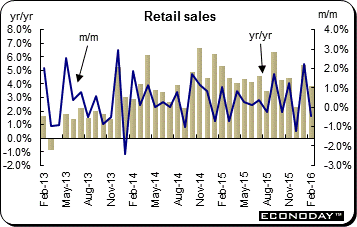 February retail sales were down 0.4 percent following a 2.3 percent surge in January. With sales particularly strong a year ago, annual growth of volumes dropped from 5.4 percent to 3.8 percent. Excluding auto fuel, purchases were only 0.2 percent below their January level and 4.1 percent higher than in February 2015. The modest monthly decline in total sales was evenly split between the food and (ex-auto fuel) non-food sectors, both of which decreased 0.3 percent. Within the latter the steepest fall was in the other stores category (0.6 percent) ahead of clothing & footwear (0.4 percent) and non-specialized stores (0.3 percent). The only increase of note was in household goods (1.4 percent). Auto fuel was down 2.4 percent. Prices were again weak. The annual change in the overall sales deflator was still deep into negative territory at minus 2.5 percent, albeit up slightly on the January rate. The comparable ex-auto fuel rate was minus 2.1 percent, unchanged from last time. February retail sales were down 0.4 percent following a 2.3 percent surge in January. With sales particularly strong a year ago, annual growth of volumes dropped from 5.4 percent to 3.8 percent. Excluding auto fuel, purchases were only 0.2 percent below their January level and 4.1 percent higher than in February 2015. The modest monthly decline in total sales was evenly split between the food and (ex-auto fuel) non-food sectors, both of which decreased 0.3 percent. Within the latter the steepest fall was in the other stores category (0.6 percent) ahead of clothing & footwear (0.4 percent) and non-specialized stores (0.3 percent). The only increase of note was in household goods (1.4 percent). Auto fuel was down 2.4 percent. Prices were again weak. The annual change in the overall sales deflator was still deep into negative territory at minus 2.5 percent, albeit up slightly on the January rate. The comparable ex-auto fuel rate was minus 2.1 percent, unchanged from last time.
Most equities retreated in the holiday shortened week. There were no major central bank meetings. The flash PMIs indicated a minor improvement in economic performance in the limited number of countries for which they are available. It was a light week for economic data otherwise.
Next week is quite different with a slew of new economic data for market participants to absorb. Japan releases the remainder of its key end of month indicators. Also this week is the very important quarterly Tankan survey. Final manufacturing PMIs for March will be posted for many Asian Pacific countries, Europe, the UK and the U.S. There are no central bank meetings, however, Fed Chair Janet Yellen will be speaking Tuesday — given this past week's FedSpeak, analysts will be comparing their respective remarks with what she has to say.
| The following indicators will be released this week... |
| Europe |
|
|
| March 28 |
Germany |
Retail Sales |
| March 29 |
Eurozone |
M3 Money Supply (February) |
| March 30 |
Eurozone |
EC Business & Consumer Sentiment (March) |
| March 31 |
Eurozone |
Harmonized Index of Consumer Prices (March flash) |
|
Germany |
Unemployment (March) |
|
France |
Consumption of Manufactured Goods (February) |
|
UK |
Gross Domestic Product (Q4.2015 final) |
| April 1 |
Eurozone |
Manufacturing PMI (March) |
|
Germany |
Manufacturing PMI (March) |
|
France |
Manufacturing PMI (March) |
|
UK |
Manufacturing PMI (March) |
| |
|
|
| Asia/Pacific |
|
|
| March 29 |
Japan |
Household Spending (February) |
|
|
Unemployment (February) |
|
|
Retail Sales (February) |
| March 30 |
Japan |
Industrial Production (February) |
| April 1 |
Japan |
Tankan Survey (Q1.2016) |
|
|
Manufacturing PMI (March) |
|
China |
Manufacturing PMI (March) |
|
|
CFLP Manufacturing PMI (March) |
| |
|
|
| Americas |
|
|
| March 29 |
Canada |
Industrial Product Price Index (February) |
| March 31 |
Canada |
Monthly Gross Domestic Product (January) |
Anne D Picker is the author of International Economic Indicators and Central Banks.
|

